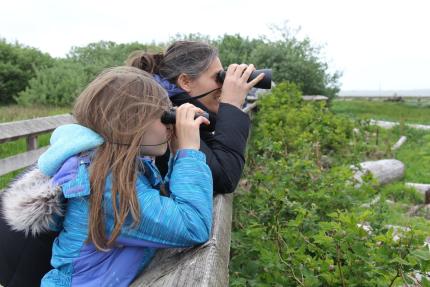
BEFORE SUBMITTING A REPORT: In the event of an immediate public safety issue, wildlife violation, or an injured or dangerous animal, please call the WDFW Enforcement office at 360-902-2936 or email WILDCOMM@dfw.wa.gov, or call 911.
Report wildlife observations and join the many community scientists who collaborate and share observations to reveal a more complete picture of wildlife species presence, health and condition, movements, and distribution patterns.
Wildlife observation reporting forms
When reporting a wildlife observation, please provide your name and email, so a WDFW biologist can confirm your observation, if needed. Your name and contact information will not be displayed on the WDFW website but this information is a public record once you provide it, and may be subject to public records requests. See WDFW Privacy Webpage for further details.
Species "At-risk" wildlife observations
Report "at-risk" wildlife observations
WDFW seeks to understand, monitor, conserve and manage for "at-risk" species in Washington. You can help by reporting wildlife observations. "At-risk" species include those designated as threatened or endangered, are considered a Species of Greatest Conservation Need (SGCN) , have a "Priority Habitat and Species" (PHS) designation, or are otherwise protected and managed for recovery. Query Washington wildlife species or learn more about conservation and management of "at-risk" species.
View a webmap of publicly-reported "at-risk" wildlife observations.
Wildlife health observations
Report sick, injured, or dead wildlife observations
WDFW seeks to understand, monitor and respond to diseases, injuries, and other conditions that affect the health of wildlife in our state. You can help by reporting sick, injured or dead wildlife. Learn more about Washington wildlife diseases and health issues.
View a webmap of publicly-reported wildlife health observations.
Report sick or dead bats
White-nose syndrome (WNS) is a deadly disease affecting Washington state bats. You can help by reporting sick or dead bats or groups of bats you find. Learn more about bats and WNS. This form is a quicker version of the larger wildlife health reporting form, so you can report in either of the two forms.
Report limping elk or elk with hoof deformities
Elk Hoof Disease is a condition that affect the health of elk in Washington state. You can help by reporting limping elk or dead elk with hoof deformities. Learn more about elk hoof disease. This form is a quicker version of the larger wildlife health reporting form, so you can report in either of the two forms.
Report marine mammal strandings
Marine mammals may become stranded on beaches or entangled in nets. In partnership with the West Coast Marine Mammal Stranding Network, WDFW monitors marine mammal strandings in Washington to track the health of populations and understand causes of mortality for these animals. You can help by reporting marine mammal strandings and by calling the marine mammal stranding hotline at 1-866-767-6114. This form is a quicker version of the larger wildlife health reporting form, so you can report in either of the two forms.
Report dead fish
Poor environmental conditions can sometimes lead to events known as fish-die offs. Reporting dead fish helps the Washington Department of Fish and Wildlife to track problems as they arise and take appropriate action to protect imperiled fish stocks.
If you would like to report a suspected oil spill or pollution release, don't use this tool; please call 1-800-OILS-911 or visit the Department of Ecology's reporting page. If you suspect poaching, file a report online or call 877-933-9847.
Report shellfish abnormalities
Washington shellfish account for thousands of jobs, provide myriad recreational opportunities, and are culturally significant to many people. To help protect this important resource, WDFW is working with tribes, researchers, and non-governmental organizations to better characterize and track shellfish diseases in Washington.
Your input can help with our data collection and response plan development. Please report any shellfish abnormalities using the above form.
Other Animal Reporting Scenarios
Non-native/invasive species
Invasive species, both plant and animal, pose a serious threat to the biological diversity of coastal waters the world over. With improvements in travel technology, the rate of introductions of non-native species has increased dramatically. You can help by reporting non-native and invasive species at the Washington Invasive Species Council website.
Report Columbia River Seals and Sealions
This Oregon Department Fish and Wildlife form allows members of the public to report seal and sea lion sightings in the Columbia River. Sightings can be reported using this web form in real-time or after-the-fact. Once submitted, WDFW will be able to access these reports. This form is only for seals and sea lions on the Columbia River. Please continue to report Washington marine mammals and other wildlife observations, using the other forms on this page.
Report wolf sightings
Report wolf sightings. Learn more about wolf conservation, management, natural history, wolf sightings and wolf packs.
Report wild turkey and upland bird observations
Report your observations of wild turkeys and upland birds to help us monitor summer broods and year-round distribution. Learn more about the turkey and upland bird survey.